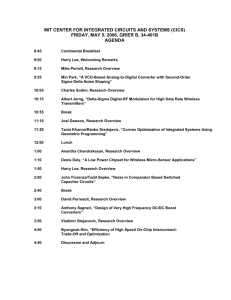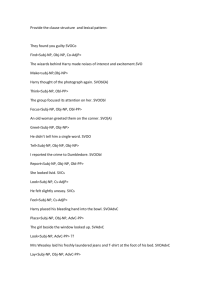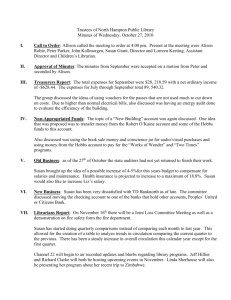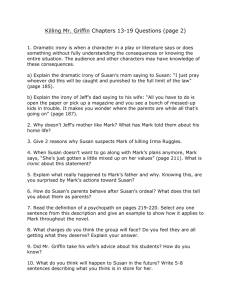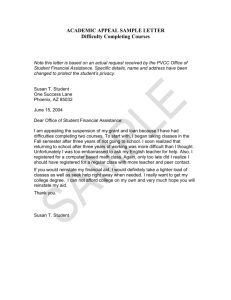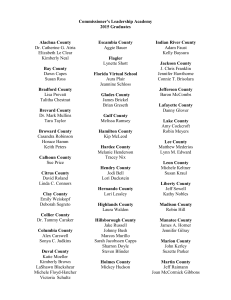Unit 9 Check Your Understanding State whether each of the
advertisement
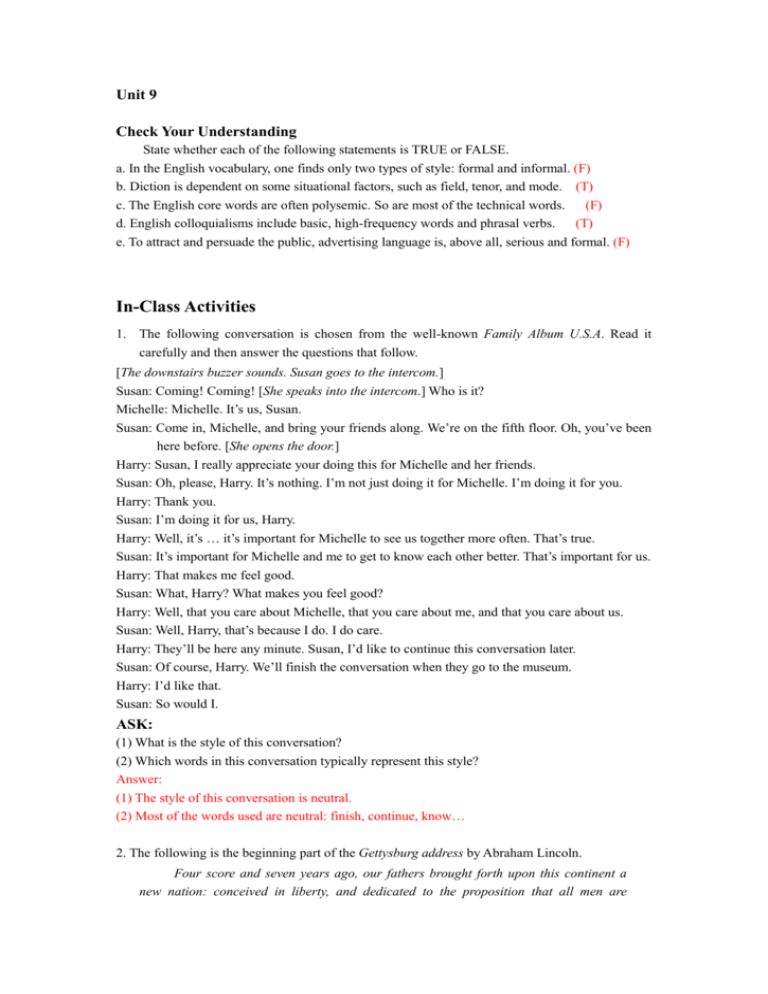
Unit 9 Check Your Understanding State whether each of the following statements is TRUE or FALSE. a. In the English vocabulary, one finds only two types of style: formal and informal. (F) b. Diction is dependent on some situational factors, such as field, tenor, and mode. (T) c. The English core words are often polysemic. So are most of the technical words. (F) d. English colloquialisms include basic, high-frequency words and phrasal verbs. (T) e. To attract and persuade the public, advertising language is, above all, serious and formal. (F) In-Class Activities 1. The following conversation is chosen from the well-known Family Album U.S.A. Read it carefully and then answer the questions that follow. [The downstairs buzzer sounds. Susan goes to the intercom.] Susan: Coming! Coming! [She speaks into the intercom.] Who is it? Michelle: Michelle. It’s us, Susan. Susan: Come in, Michelle, and bring your friends along. We’re on the fifth floor. Oh, you’ve been here before. [She opens the door.] Harry: Susan, I really appreciate your doing this for Michelle and her friends. Susan: Oh, please, Harry. It’s nothing. I’m not just doing it for Michelle. I’m doing it for you. Harry: Thank you. Susan: I’m doing it for us, Harry. Harry: Well, it’s … it’s important for Michelle to see us together more often. That’s true. Susan: It’s important for Michelle and me to get to know each other better. That’s important for us. Harry: That makes me feel good. Susan: What, Harry? What makes you feel good? Harry: Well, that you care about Michelle, that you care about me, and that you care about us. Susan: Well, Harry, that’s because I do. I do care. Harry: They’ll be here any minute. Susan, I’d like to continue this conversation later. Susan: Of course, Harry. We’ll finish the conversation when they go to the museum. Harry: I’d like that. Susan: So would I. ASK: (1) What is the style of this conversation? (2) Which words in this conversation typically represent this style? Answer: (1) The style of this conversation is neutral. (2) Most of the words used are neutral: finish, continue, know… 2. The following is the beginning part of the Gettysburg address by Abraham Lincoln. Four score and seven years ago, our fathers brought forth upon this continent a new nation: conceived in liberty, and dedicated to the proposition that all men are created equal. Now we are engaged in a great civil war. . .testing whether that nation, or any nation so conceived and so dedicated. . . can long endure. We are met on a great battlefield of that war. We have come to dedicate a portion of that field as a final resting place for those who here gave their lives that this nation might live. It is altogether fitting and proper that we should do this. But, in a larger sense, we cannot dedicate. . .we cannot consecrate. . . we cannot hallow this ground. The brave men, living and dead, who struggled here have consecrated it, far above our poor power to add or detract. The world will little note, nor long remember, what we say here, but it can never forget what they did here. ASK: (1) What is the style of this part of Lincoln’s speech? (2) What are the characteristics of the vocabulary of this part of speech? Answer: (1) The style of this speech is formal. (2) Formal words are used: dedicate, consecrate, conceive, proposition 3. The meanings of many sports jargons are extended into non-sports contexts. For example, kick off originally means “begin” in a soccer game; now it may mean “begin” in any context; throw in the towel originates in boxing where boxers admit defeat by throwing the towel into the ring; later it is extended into daily conversation. ASK: (1) Can you tell what sports the following jargons originate from? (2) What are their extended meanings in non-sports contexts? Answer: a. hit a home run (baseball, extended meaning: “succeed with something”) b. jockey for position (horse race, extended meaning: “work oneself into a desired position”) c. make a pit stop (motor racing, extended meaning: “a brief rest”) d. tackle a problem (football or hockey, extended meaning: “attend to”) e. dirty pool (billiards, extended meaning: “Unjust or dishonest conduct”) f. take the wind out of one’s sails (sailing, extended meaning: “make less confident”) g. right off the bat (baseball, extended meaning: “immediately”) h. to be neck and neck (horse racing, extended meaning: “close, equal”) i. go to bat for someone (baseball, extended meaning: “support, help”) 4. As introduced above, affixation is one method to coin new words in English advertisements. Apart from “ex-”, “super-” and “-y” are two affixes often used in English advertisements, such as superexcellent, superfine, supereminent, toasty, crispy, and juicy. ASK: (1) What do the affixes mean? (2) Can you find more English ads containing these three affixes? Answer: (1): Super-: to an extreme degree -y: full of, having the quality of 5. The following three pictures bear some words. Observe the words and answer the ensuing questions. ASK: (1) Where do the words in each of the pictures most probably appear? (2) What are the differences between the features of the words used in the first two pictures and those in the third one? Answer: (1) (1st ad) On a cigarette package, (2nd ad) on the cover of a CD, (3rd ad) at the gate of an institution (2) Words in the first two advertisements are informal while words in the third one are formal. 6.The following pictures are collected from some departments of a hospital. Look at these pictures and answer the questions that follow. ASK: (1) What kind of hospital are these departments in? (2) What are the characteristics of the English terms in the pictures? Answer: (1) In a hospital of stomatology (2) Most of the words in the terms are technical terms in stomatology. Post-Class Tasks 1. The following table contains some words in two columns. For each word, find a word or phrase which is less formal or more formal: More formal Less formal offspring Children purchase buy cancel call off commence begin decease die peruse read reply answer Participate in take part in encounter come across tolerate Put up with 2. Define the following Internet terms. You may refer to dictionaries. IRC, URL, FTP, LAN, WAN, PDF, JPEG, HTML, applet, browser, plug-in, navigation buttons, hypertext Answer: IRC: Internet Relay Chat URL: Uniform resource locator FTP: file transfer protocol LAN: local area network WAN: wide area network PDF: portable document format JPEG: joint photographic experts group HTML: hypertext markup language applet: a very small application browser: computer software used to search for information on the Internet plug-in: a software able to be added to a system to give extra features or functions navigation: the action of moving around the a website, the Internet buttons: a small outlined area in a dialog box that you can click to select an option or command hypertext: a software system allowing extensive cross-referencing between related sections of text and associated graphic material 3. Replace the underlined part in each of the following headlines with the shortest possible word. Write these words in the parentheses. ( aid )1. New Groups promote Hi-Tech Research ( probe )2. Investigation sees SMS potential. ( ties )3. Emperor’s visit a milestone in bilateral relations. ( pact )4. Tension grows as troops agreement broken ( cut )5. Congress, Overriding Bush, Blocks Pay Reduction for Doctors. ( eye )6. World watches Mid-East peace talks ( move )7. Government’s campaign to sell bonds ( lauds )8. Premier praises rail workers 4. Discuss the stylistic features of the words used in the following headlines. a. Weekly Mag for Stamp Lovers to be Launched (use of abbreviated word: “Mag” for “magazine” ) b. Far from the epicenter of power in Bangkok, grass-roots governance is beginning to flourish. (use of metaphor: epicenter and grass-roots) c. NATO Hires a Coke Executive To Retool Its Brand (use of abbreviated words: NATO, Coke; use of metaphor: retool) d. AIDS Victims Surging in US (vivid use of word: surge) e. Fed Chief Bleak on Economic Outlook. (use of abbreviated word: Fed) f. McCain Uses “Bundler” Money More Than Obama Campaign (use of slang: “Bundler”) g. Cole was addicted to LSD, cocaine and heroin before becoming clean of drugs in 1984 following a long stay in rehab. (use of initialism: LSD, rehab) h. Shutdown of Internet Lifeline to Hit Rural Police Forces Hard (use of metaphor: lifeline; use of familiar word: hit hard) i. The Kremlin declined comment as Norway was expelling 8 Russian diplomats for activities incompatible with their status. (use of metonymy: Kremlin) j. Because of his one-man style of operation, Kissinger had become a kind of bottleneck in his own NSC system (use of metaphor: bottleneck; use of initialism: NSC, National Security Council) 5. Use what you have learned to analyze the diction of the following piece of news. Francis Plays Big in Shaq-Yao Showdown Francis scored a career-high 44 points, stealing the spotlight away from Shaquille O'Neal and Yao Ming and lifting the Houston Rockets to a 108-104 overtime victory over the Los Angeles Lakers. The use of metaphors: showdown; steal the spotlight away The use of familiar words: score, steal, lift The use of informal word: play big 6. Sports broadcast is often jammed with slang and jargon, which is best reflected in the following report on a basketball game. Can you rewrite this report with Standard English and then translate it into Chinese? What a barnburner today in basketball! At first, the game looked like a wash, but Jones created a turnover after a steal in the far court. He was fouled on the lay-up and made the freethrow to cut the lead to 11. After a missed shot, Smith pulled down the rebound, dribbled past half court and threw the alley-oop to Taylor for the jam. These guys can really shoot hoop! (The black italicized words are slang or sports jargons.) Answer: What a contest today in basketball! At first, the game looked like one which benefits neither side, but Jones lost the ball after a steal in the far court. The opponent violated the rule so that he was awarded an unimpeded throw and reduced the leading score to 11. After a missed shot, Smith obtained the rebounded ball, dribbled past half court and threw the ball in the air to Taylor for the shoot at the goal. These guys can really shoot the goal! (The black italicized words are slang or sports jargons.)
